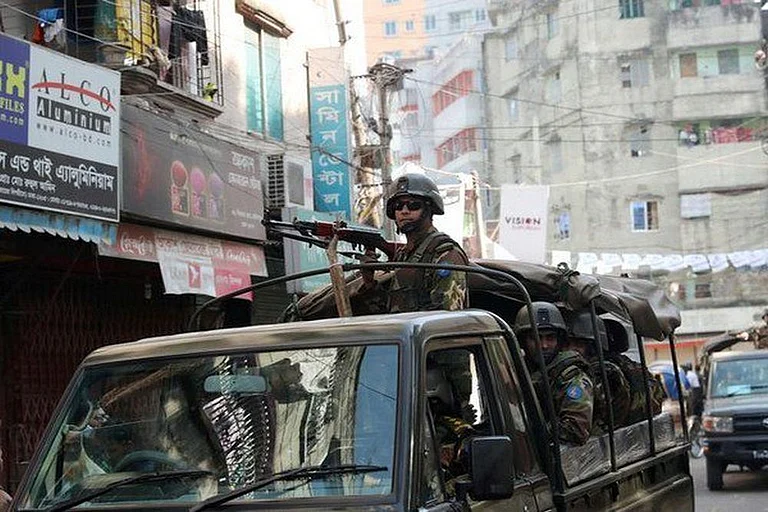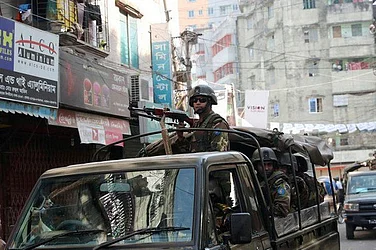It is now over 10 days since the Israeli army laid siege at al-Shifa Hospital, the largest hospital in the Gaza Strip, after dropping bombs on it in search of Hamas militants. The search came at the cost of about 2,500 displaced people, mobile patients, and medical staff who were evacuated from Shifa Hospital, once a refugee camp. A few still remain at the site. The world continues to watch closely with scrutiny growing against the Israeli officials who alleged the hospital was a key Hamas command centre. The officials claimed that the troops found a tunnel, along with guns and other weapons that allegedly belonged to the militant group.
Six weeks into the war, several governments and international authorities have started to condemn the atrocities against Palestinian civilians and the escalation in tensions in the name of a counterattack against Hamas. The deaths in Gaza have crossed the 13,000 mark, and devastations and injuries are beyond imagination. Many are now fearing the possibility of a larger war in the Middle East. The United Nations has demanded urgent and extended humanitarian pauses in Gaza but the resolutions have so far been vetoed by the United States.
The United States, said to have the highest power in stopping the war in Gaza, has been endlessly funding Israel with military supplies to ‘prevent escalation’ and draw in other parties or nations and to also help further bolster its own defence capabilities. US President Joe Biden, although condemned the bombings on civilians, has received criticism for his lack of action against the continuous destruction and abomination that the Jewish government is causing against civilians in Gaza.
Last week, The Elders, an international NGO of senior statesmen, peace activists and human rights advocates brought together by Nelson Mandela, wrote to Biden in an open letter, warning him that the US’ “credibility and interests across the world are at stake” in this war.
“The violence is already feeding antisemitism and islamophobia, including in the USA. It undermines your other objectives in the Middle East, Ukraine and elsewhere,” they wrote, adding that the US cannot bring peace to the Israel and Palestine conflict alone but can help build a coalition to restore the trust needed for dialogue.
Political polarisation has deepened far from the conflict. Much misinformation and disinformation has been floating around on TV and, especially, the internet. From Israeli officials to media outlets to influencers and popular figures on the internet, many hands have been involved in the spread of fake news to hide the magnitude of devastation in Gaza against that of Israel.
The war has widened a rift between the West and the Global South, which was evident in the UN General Assembly vote, where only 14 countries voted against a ceasefire while 120 were in favour. Even the leaders of countries like the UK and Germany, which have been among the strident supporters of Israel, like the US, abstained from the vote. They were among 45 who abstained.
Meanwhile, in Ireland, which is among the very few nations in the West that have strongly opposed Israel’s occupation in Gaza, lawmakers entered a heated debate over the expulsion of Israel's ambassador to Ireland, Dana Erlich, until there is a ceasefire between Israel and Hamas. Mary Lou McDonald of Sinn Féin, the nationalist party on course to win the polls in the next election, said that the Israeli ambassador should "no longer enjoy diplomatic status in Ireland". The motion was, however, defeated in Parliament.
Norway, another Western nation advocating for Palestinian rights, is the chair of the international donor group to the Palestinian territories, called the Ad Hoc Liaison Committee. Norway was also a facilitator in the 1992-93 talks between Israel and the Palestine Liberation Organization (PLO) that led to the Oslo Accords, which facilitated a brief Palestinian self-rule.
Key leaders of the Global South have come out in support of the Palestinian fight for justice. Indonesia, Malaysia, Turkey, Iran, Iraq, Oman and other nations with large Muslim populations have been critical of Israel’s bombing campaign, but their criticism has been strengthened by support from Brazil and South Africa, who have expressed deep concern and called for an end to the violence.
Brazil’s President Luiz Inacio Lula da Silva went as far as to call Israel’s war on the Gaza Strip a “genocide”. “Frankly, I do not know how a person can go to war knowing that the result of that war is the death of innocent children,” he had condemned.
Meanwhile, South Africa is hosting a virtual meeting of the BRICS group of nations, including Russian President Vladimir Putin, to address the war on Gaza. South Africa’s ruling party, the African National Congress (ANC), has often linked the ongoing war to its own struggle against apartheid. The government has also decided to suspend diplomatic relations with Israel until a ceasefire deal is reached.
The question is, if so many international communities are calling for an end to the war, how long will it take for the West to listen? So far, the public statements and voting patterns of Western representatives at the UN suggest that a resolution is still distant.


























